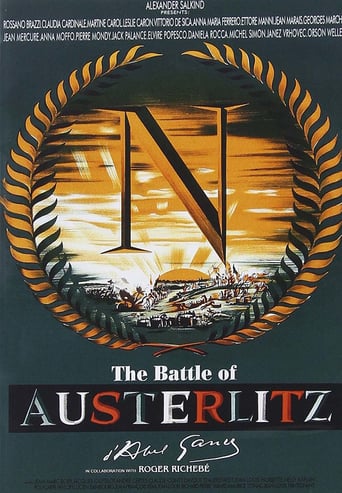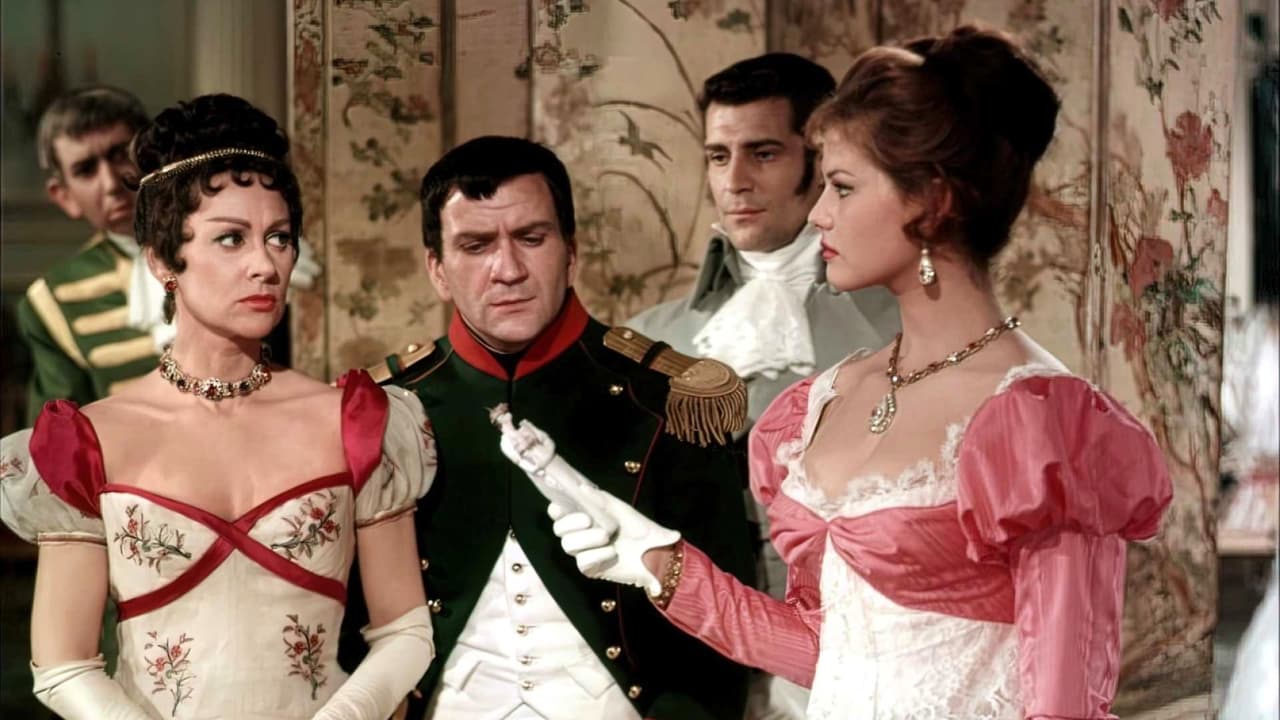dbdumonteil
...and to "Napoleon" whose life Gance transferred to the screen in the silent era.Sandwiched between two very underrated Gance works ("la Tour de Nesles" and "Cyrano et D'Artagnan" )it is a return to "real " "true" history.I will go as far as to write that Gance impressed me much more when his movies dealt with fictionalized history (the two mentioned movies,but "j'accuse" too)."Austerlitz has something academic ,conventional.It has nothing of Gance's madness.The first part is a stream of stars from Martine Carol to Claudia Cardinale ,from Jean Marais to Orson Welles (in a part which reminds us how Gance was interested in the development of science through the centuries ,à la Jules Verne,we find this interest in "Cyrano" and "J'accuse" too).THe lead is a good actor but he might be ,on an international level, the least known of them all:Pierre Mondy's name is buried in the cast and credits and although he is on the screen from the beginning to the end,his name is not bigger than that of Welles who appears barely five minutes.Ah fame! The first part has only one sequence where we find back the inventive Gance:we do not attend the coronation in Notre Dame ;the marechal de Ségur (Jean-Louis Trintignant) tells the whole story with the model in front of a strange audience:servants ;then the "mamma " ("pourvu que ça dure!=lets hope it lasts!") ,Napoleon's mother (Elvire Popesco) enters and her tears begin to flow .Although David put her in his famous painting she did not attend the ceremony.The second part is more historically interesting ,but if you are not fond of military strategy ,you may stop yourself yawning.Fortunately a soldier of the old guard of Napoléon (un "grognard" )played by Michel Simon brings a bit of life among these troop movements.Last but not least:I have always asked myself why a convinced pacifist such as Gance (his two versions of "j'accuse" may be the strongest anti-war films ever)could be so fascinated by a warrior such as Napoleon.
dkaravaev53
Concerning depiction of the Russian army in 1805 (historical figures, uniform, people's manners in the military camp and at the battlefield) this film of Gance is somewhat of a cabaret performance. Alexandre I is a kind of a funny mask, Koutouzov - even worse. Russians' uniform and Cossack dances are acceptable for some carnival but certainly not for the historical reconstruction. Above all there is an obvious comic accent in this movie, even in the main episode of the battle. Though the script is not bad being based on the reliable historical source (memoirs of the count Segur) the figure of Napoleon is also ridiculous in some scenes (I wonder why do French actors like to show him as a character of "comedia del Arte"?). To make my claims more motivated I recommend you to compare this "Austerlitz" with the appropriate episode in "War and Peace" by Sergey Bondarchuk - much more dramatic, serious, large-scaled and true in details.
francophile50
My review of this film can be summed up in five words a brilliant work of art.As described in the previous description the film itself is long and sometimes tedious.What it fails to mention is that it was created by the same Director that brought us the Silent film about Napoleon Abel Gance.The film is in colour and is very faithful to the feel of Napoleon and the time he ruled Europe.It is primarily about the greatest victory Napoleon achieved in his career,however it also touches on many of the events in his life leading up to that moment including his coronation as Emperor of France.If you are a student of Napoleon or French history or this time period you will enjoy this picture.Shot all throughout Europe in the fifties in many languages it remains in my opinion as the greatest picture chronicling Napoleon and his life.The film not only tells a story from his perspective but many others as well.It is difficult to find and even more expensive to own but I definitely recommend you see it at least once for yourself.
delbruk
I believe the reason after so many votes that no one has decided to offer a review of this film is because it appears so hard to define it as a film. This is much more a tedious, detailed account of Napoleon's victory at the battle of Austerlitz. The film focuses so much on the strategic underpinnings of the battle that is almost seems more like watching a risk or stratego game than a film. From the political maneuvering of how the French and Russian forces came to the battle to the strategic genius that was Napoleon this film does not offer much in the way of character development, acting, or even special effects. What the film does offer is a historical recount of how battles were fought in the early 19th century. The only interesting cinematic points of interest is to look for a young Jack Palance as a Russian General and a scene stealing Orson Welles as an American inventor. Also this was one of the last films directed by the French "DW Griffith" - Abel Gance.


 AD
AD


